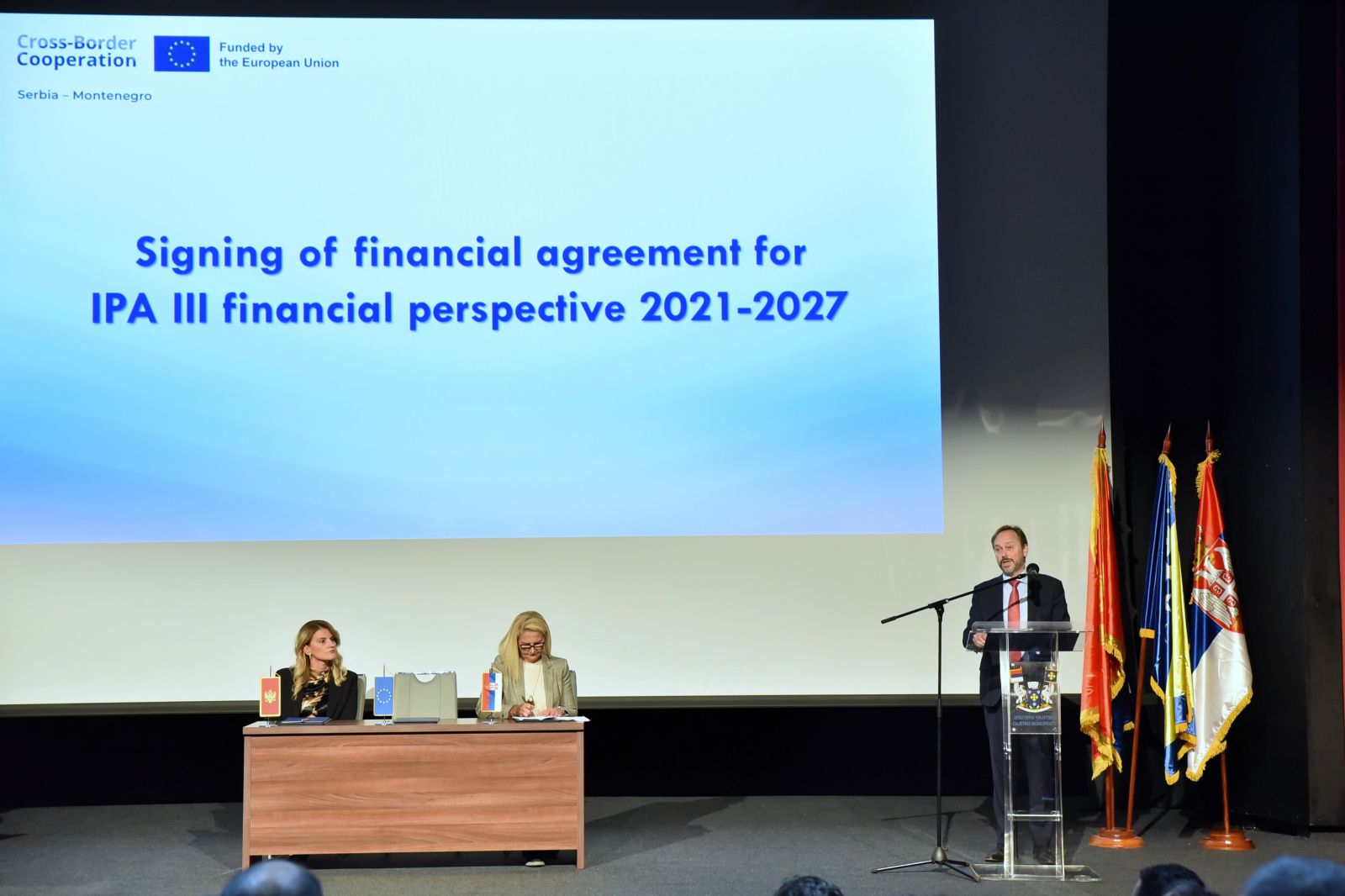Minister of European Integration of Serbia and National IPA Coordinator Tanja Miščević signed today in Zlatibor the Financial Agreement on the IPA III 2021–2027 financial perspective for the Serbia-Montenegro cross-border cooperation programme in the amount of EUR 8.4 million. The Agreement was signed on behalf of the EU by EU Ambassador to Serbia Emanuele Giaufret, while on behalf of Montenegro, State Secretary in the Ministry of European Affairs of Montenegro and national IPA coordinator Milena Žižić signed the agreement.
During the signing of the agreement, Miščević said that it was very important to continue cross-border cooperation projects, colloquially called “small IPA”.
“Because it is a matter of much smaller funds, but of immeasurable impact. The projects that Serbia has with its neighbours have so far benefited hundreds of thousands of citizens of the Republic of Serbia, and an equal number of people on the other side of the border. Together, we can do much better and be more efficient as opposed to closing ourselves in national borders and not seeing that if we toss the waste over the fence, it will come back to us in some way,” said Miščević.
She added that it was in everyone’s interest for the projects to be efficient.
“It is an indicator of the partnership that the states have with the EU, it is not only a matter of our European path and membership, it is a partnership that goes beyond the partnership negotiations themselves. Soon there will be calls in the cross-border programme with Montenegro, amounting to 8.4 million, and 12.6 million with Bosnia and Herzegovina with priorities in health care, tourism, social inclusion, social work and protection of cultural property”, stated Miščević.
Giaufret said that good neighbourly relations and cooperation lay at the heart of European projects and that cross-border cooperation projects led to better cooperation between regions.
“Among the projects that will be implemented are projects related to employment, social law, public health, tourist offers and nurturing the rich cultural heritage of the two regions,” Giaufret said during the signing of the agreement. He said that he hoped that the signed agreement would be followed by the signing of the Serbia–B&H agreement in the near future.
“These programmes serve as a beacon of hope and progress in these regions, they strengthen the ties that exist between neighbouring nations and serve as an indicator of the EU’s commitment to a prosperous and peaceful Europe that represents the destination and path of all these countries,” said Giaufret.
Žižić recalled that the cross-border cooperation between Serbia and Montenegro dated back to 2008 and that until then, through six public calls, 62 projects worth more than EUR 13 million had been contracted. The projects were implemented in the fields of culture, health, economic cooperation, social inclusion and employment, environmental protection, adaptation to climate change and the development of tourism potential, and aimed at improving the quality of life of people in the municipalities in the north of Montenegro, as well as in the Raška, Zlatibor and Moravica districts in Serbia.
“The cross-border cooperation programme for the 2014–2020 period contributes to the economic, social and territorial development of the area by encouraging integration, joint development and the use of potential and opportunities in order to make this region attractive for life and work, which is achieved through the 26 projects contracted so far within the financial perspective of IPA II”, said Žižić.
She stated that the third call had been open for the area of increasing employment, improving waste management and waste-water treatment and improving capacity for using tourist potentials, adding that its value was EUR 3.41 million and that 10 projects were contracted. Žižić said that, over the last 15 years, the projects had contributed to the development of the area and the overall cooperation between Serbia and Montenegro, and she expressed her satisfaction with the continuation of cooperation through the next IPA III programme for 2021–2027, which would focus on two specific goals related to improving the quality of public, health and social services for the inclusion of marginalised groups in the border area.
After the signing, grants were awarded within the Third Call for Project Proposals from the IPA II 2014–2020 Financial Perspective for two cross-border cooperation programmes: Serbia – Montenegro and Serbia – Bosnia and Herzegovina. Twenty-three contracts worth EUR 6.6 million were awarded, which will contribute to the development and improvement of health services, social inclusion, tourism and tourist infrastructure, economic development, entrepreneurship, promotion of biodiversity, improvement of entrepreneurial skills and opportunities for vulnerable groups and young people in these cross-border areas.
Source: Tanjug


